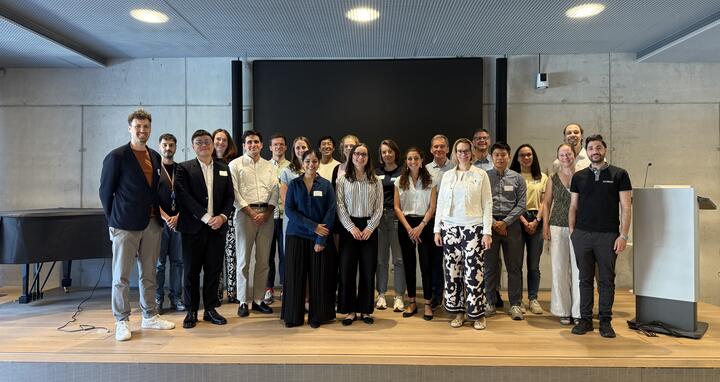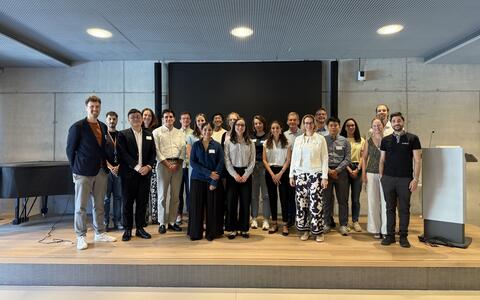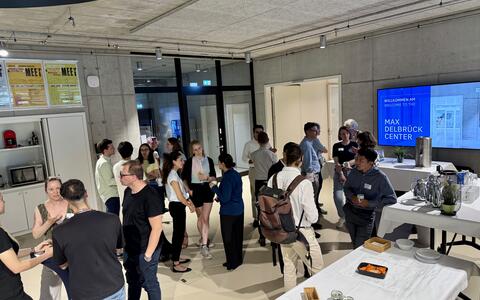Our inventors meet Berlin’s venture capitalists
Next-generation CAR T-cell therapies engineered to disrupt tumor microenvironments; deep phenotyping of neurodegenerative diseases to develop new drugs – these were among the spinoff projects pitched by our scientists last week during VC Day.
Twelve inventors supported by the Innovation and Entrepreneurship team were invited to present their projects in 5-minute pitches to a room of representatives from venture capital (VC) firms and BIH’s new Clinical Incubator (CLIC). The presentations, covering innovations in data science and diagnostics to therapeutics and engineering, were each followed by ten minutes of targeted feedback from the experts. Six VCs participated, including Apollo Health Ventures – a transatlantic early-stage biotech – and bmp Ventures – an early-stage German life sciences VC– in partnership with global shared lab facilities network BioLabs.
Full of inspiration and innovation: Our scientists on stage.
Early venture capital exposure
VCs are firms that invest in high-potential start-ups in exchange for equity, aiming for a financial return on their investment. Pitching to VCs generally occurs later in the development process, once a start-up has formed and is seeking seed funding.
Unconventionally, VC Day at the Max Delbrück Center gave inventors the unique opportunity to pitch at any stage of development – from early translational research to more advanced spinoff projects. This idea emerged through conversations that Dr. Nevine Shalaby, head of the Max Delbrück Center’s Innovation and Entrepreneurship department, had with VCs in her network. “They told me, ‘Actually we love to listen to projects early in development because that’s when we can give useful feedback to help shape the project from a business perspective,” Shalaby recalls.
The participants engaging in conversation during the networking session.
As with any skill, practice improves performance. “We wanted to give our scientists the opportunity to pitch, receive expert feedback, improve, and repeat,” Shalaby adds. Feedback at such an early stage, “encourages scientists to think about how they can develop their translational project with a commercial mindset.” Advice was tailored to each project. VC representatives offered insight on timelines, target markets, and business models – key elements of a solid commercial strategy.
Dr. Klaas Yperman, one of the department’s innovation managers, also participated in the event as the business lead of a neuropathic pain therapy spinoff. Involvement of funders from a project’s earliest stages helps to build trust and long-term relationships that can lead to future investment, he says. “VCs often want to see a project develop over time through multiple interactions before they commit to investing.”
Informal setting
The participating inventors and VCs benefited from the small group format. Each pitch received feedback from multiple perspectives, and informal networking during breaks allowed for deeper conversations. “Having a small internal event allowed us to engage directly with the VCs,” says Yperman, “This wouldn’t have been possible in a large, 100-person setting.”
The VCs that I spoke to were very impressed with the quality of the scientists’ pitches.
The benefits of the network created between Max Delbrück Center’s inventors and industry partners extended beyond those present in the room. “Even if your project didn’t fit a particular VC’s portfolio, they might say, ‘I know someone at another firm who could be interested – I’ll introduce you,’” explains Yperman. By showcasing some of the up-and-coming innovation talent from the Max Delbrück Center, the event also helped put the center on the map for Berlin’s biotech funders.
Training Berlin’s next biotech entrepreneurs
“The VCs that I spoke to were very impressed with the quality of the scientists’ pitches,” says Shalaby. Several pitches sparked follow-up discussions.
It’s an exciting time for innovation and translation, she adds. Upcoming activities include a workshop funded by H3 Health to train spinoff founders on how to navigate the regulatory path from lab to market. Meanwhile, preparations are underway for the opening of a knowledge hub that will serve as an incubator to support spin-off projects, not only by providing laboratory space, but also entrepreneurship training, networking and venture-building opportunities at Max Delbrück Center’s Campus Buch later this year.
Text: Anita Waltho







